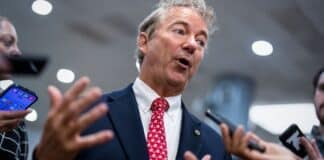“In other words, the goal is to censor those with whom the authors of the bill disagree,” wrote the attorneys general.
Twenty Republican state attorneys general signed a letter denouncing the House Democrats’ controversial election reform bill as unconstitutional for a slew of reasons just hours before the measure was expected to be voted on.
The letter — led by Indiana Attorney General Todd Rokita — tore into H.R. 1, the “For the People Act,” a massive election reform bill and a leading priority for House Democrats this Congress.
“This monstrosity of a bill betrays the Constitution, dangerously federalizes state elections, and undermines the integrity of the ballot box,” Rokita said in a statement to Fox News. “As a former chief election officer, and now an Attorney General, I know this would be a disaster for election integrity and confidence in the processes that have been developed over time to instill confidence in the idea of ‘one person, one vote.’”
The attorneys general said the bill “betrays several Constitutional deficiencies and alarming mandates” that would “federalize” statewide elections across America and that “states have principal —and with presidential elections, exclusive — responsibility to safeguard” how they hold elections under the Constitution.
“The Act would invert that constitutional structure, commandeer state resources, confuse and muddle elections procedures, and erode faith in our elections and systems of governance,” they wrote.
They then warned lawmakers that they “may wish to consider the Act’s constitutional vulnerabilities as well as the policy critiques of state officials.”
The twenty attorneys general marched on in their letter, arguing that the For the People Act “implicates the Electors Clause” of the Constitution. The Electors Clause guarantees each state legislature the right to “direct allotment of presidential electors, and separately affords Congress only the more limited power to ‘determine the Time of chusing the Electors.’”
The attorneys general argued that this “exclusive division of power” outlined in the Constitution “differs markedly” from the Election Clause in Article I of the Constitution, “which says that both States and Congress have the power to regulate the ‘time, place, and manner’ of congressional elections.”
“That distinction is not an accident of drafting,” wrote the multi-state legal team. “After extensive debate, the Constitution’s Framers deliberately excluded Congress from deciding how presidential electors would be chosen in order to avoid presidential dependence on Congress for position and authority.”
The group then pointed to the 1892 Supreme Court case McPherson v. Blacker that “[upheld] a Michigan statute apportioning presidential electors by district.”
“The exclusivity of state power to ‘define the method’ of choosing presidential electors means that Congress may not force states to permit presidential voting by mail or curbside voting, for example,” the group wrote.
The group pointed to a 2019 opinion by Chief Justice John Roberts, where Roberts “noted with respect to congressional elections, the Framers ‘assign[ed] the issue to the state legislatures, expressly checked and balanced by the Federal Congress.'” They then blasted the bill as not having Congress act “as a check, but is instead overreaching by seizing the role of principal election regulator.”
The attorneys general torched the bill’s “constitutional deficiencies” as “only the beginning of the Act’s problems” and that, “[a]s a matter of election administration policy, it is difficult to imagine a legislative proposal more threatening to election integrity and voter confidence.”
They took aim at the For the People Act’s “limitations” on voter identification laws, roasting the act as doing “little to ensure voters say who they are” and pointing out that “requiring” a government ID to vote in an election “represents nothing more than a best practice for election administration.”
“Government-issued photo identification has been the global standard for documentary identification for decades,” the lawyers wrote, saying that “nearly twenty years ago” the Help America Vote Act required proof of identification for “first-time voters who register by mail without proof of identification.”
They continued on to say that Help America Vote Act “required” said voters to “present identification either to the county voter-registration office or at the polls.”
“Worse, it vitiates the capacity of voter ID requirements to protect against improper interference with voting rights,” the letter reads. The attorneys general went on to say the act was “not a fair election law” as it does not “treat all voters equally.”
The letter also argued that the bill would “limit how states maintain voter registration rolls” while ensuring integrity in elections, saying that “under the act,” states “could not use a combination of voter inactivity and unresponsiveness to maintain voter lists.” Instead, under the act states may “remove illegitimate voter registrations” when officials have “some other unspecified ‘objective and reliable evidence'” that the person isn’t eligible to vote.
The attorneys general wrote that “this attack on reliable methods” states have been using to “maintain voter lists without specifying any reasonable permissible alternatives belies any actual interest in preventing voter fraud.”
“The objective, rather, seems to be to prevent meaningful voter list maintenance altogether,” the letter read.
The lawyers then slammed the “so-called ‘independent’ commissions” that states would be required to use when redrawing congressional district lines after each census under the For the People Act. The attorneys wrote that the “aim” of the “provision” was to end “‘political gerrymandering'” and that the reason behind the provision was the “incoherent supposition that drawing congressional districts is something other than a political act.”
They argued that, “as with any legislation,” redrawing congressional districts “requires officials to balance legitimate competing considerations, and in so doing advance some political interests over others.”
“At least when legislatures draw boundary lines voters may punish egregious behavior at the next election; not so with government-by-commission, which trades accountability for mythical expertise and disinterest,” the team wrote.
“With respect to political redistricting, no ideal, perfectly balanced congressional boundaries exist, so we should let the people decide, through their elected officials, where to place them,” they continued.
To round off their letter calling on Congress to rethink H.R. 1, the attorneys general blasted the bill’s “requirement that political speakers disclose their donor lists.” The group said the bill “reflects an objective to name, shame, and blacklist” those who have “different or minority viewpoints.”
“In other words, the goal is to censor those with whom the authors of the bill disagree,” wrote the attorneys general.
“In the American tradition, the antidote for bad speech is more speech, not less,” they continued. “When people and organizations carry their chosen messages into the public arena, government should not cater to those who would intimidate or disrupt that same speech.”
The group of twenty attorneys general finished the letter promising that, should the For the People Act become law, they would “seek legal remedies to protect the Constitution, the sovereignty of all states, our elections, and the rights of our citizens.”
The House of Representatives on Wednesday canceled scheduled votes for Thursday amid reports of potential security threats against the Capitol. Lawmakers are expected to vote late into the night.






